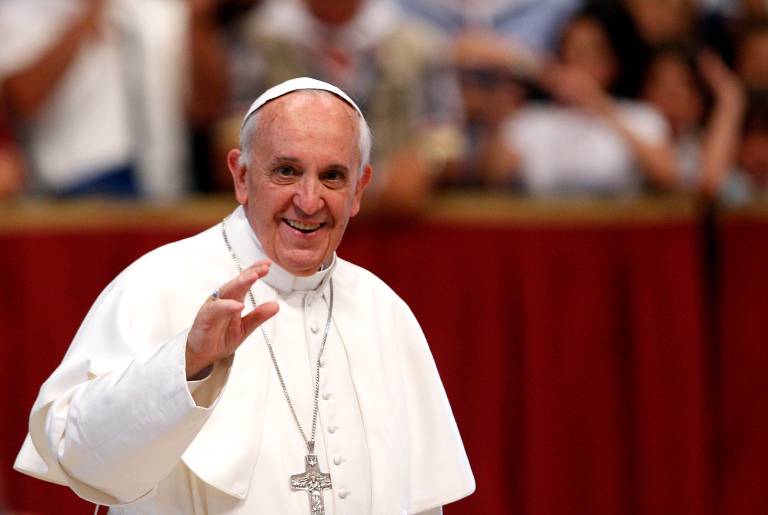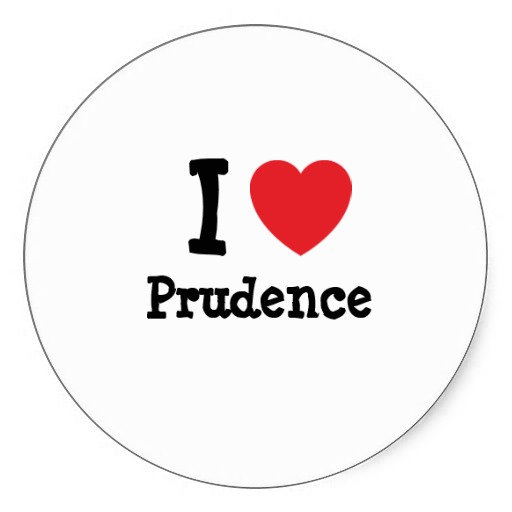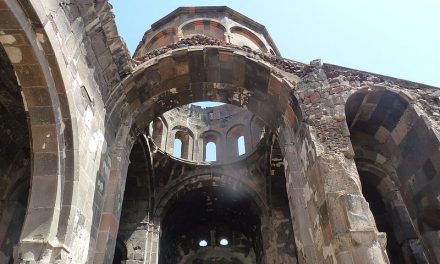Throughout Pope Francis’ interview, he works a set of contrasts that are fundamentally spatial images. In speaking about his choice to live in the guest house, rather than in the papal apartments, he remarks that the papal apartment “is not luxurious” but “in the end it is like an inverted funnel. It is big and spacious, but the entrance is really tight.” He repeatedly uses the language of “looking to horizons” and of “frontiers,” noting that the latter image suggests “the need for those who work in the world of culture to be inserted into the context in which they operate.” He then contrasts this with “the lurking danger of living in a laboratory. … I am afraid of laboratories because in the laboratory you take the problems and then you bring them home to tame them, to paint them, out of their context. You cannot bring home the frontier, but you have to live on the border and be audacious.” (This insistence on treating problems in context, rather than in the lab, is explicitly referenced in his now-well-known remarks on abortion, gay marriage, and contraception.) Perhaps most starkly, he elsewhere insists that “we must initiate processes rather than occupy spaces” – the former involves constant movement, an alertness to the God who “is present in the processes of history,” whereas the latter involves static defense and a preoccupation with safety.
As I noticed how frequently these spatial descriptions appeared, I saw them linked to his assertion that “a Jesuit must be creative.” The theme of creativity and fruitfulness is a product of spatial expansiveness. Rather pointedly, he notes: “when I perceive negative behavior in ministers of the church or in consecrated men or women, the first thing that comes to mind is: ‘Here’s an unfruitful bachelor’ or ‘Here’s a spinster.’ They are neither fathers nor mothers, in the sense that they have not been able to give spiritual life.” Thus, his concern over small, defensive spaces is driven by his concern that the Church bear genuine fruit. Whatever is meant by his critiques of “rigidity” and “small-minded rules,” he clearly sees a Catholicism focused on these as a kind of dying museum piece, driven by self-preservation and deep anxiety. It fails the fundamental “missionary imperative” at the center of the Church’s identity.
Does all this make Pope Francis a liberal? Perhaps this is an unhelpful question; yet consider Michael Peppard’s excellent piece, suggesting that while the pope may not have all the beliefs of a liberal, he does have a liberal temperament. Peppard draws on Alan Wolfe’s contrast: the liberal temperament “has more to do with psychology than politics or morality.” It is fundamentally “impatient with arguments rooted in fear and self-protection.” A person with this temperament remains consistently “open to a sense of discovery, anticipates the future with excitement, and approaches the world with generous spirit.”
This would seem to fit the pope’s sense of spatial expansiveness quite well. But does the label really capture what Francis is describing in his spatial metaphors? Does it say much, for example, of the problems of a “lab faith”? Are laboratories “conservative”?
The debate over labels would be helped if there was a clearer acknowledgment that liberalism, in addition to its political connotations, has historically had a theological meaning as well. Politically, there is a pretty vigorous argument from the Church’s social teachings that the Church is not “centrist,” but rather moves much further to the Left than most American “liberals.” But theological liberalism is something else. (Warning: Inevitable blog simplification of a complex phenomenon ahead) It has historically meant an aversion to doctrines and forms of piety that seem superstitious, a “religion within the limits of reason,” one focused strongly on ethics, and not supernatural piety or miracles. Now, there is zero sign that Francis is liberal in this sense, any more than John XXIII was. Theological liberalism is also historically suspicious of privileging religious institutions or tradition, preferring to allow individuals and interior experiences to do the heavy lifting of religious life. That is, it is methodologically committed to an individualism – not in the sense that (subsequent) community is denied, but in the sense that the fundamental relationship with God is im-mediate, rather than necessarily mediated. Again, it seems impossible to say that Francis is a liberal in this sense. Francis is clearly an institutional reformer – but so were Erasmus, Newman, and many others who do not subscribe to the basic premise of theological liberalism that privileges the individual. Finally, theological liberalism has most often been associated with a doctrinal skepticism about sin, especially about the doctrine of original sin, preferring a more optimistic assessment of human possibilities. And here again, it would be difficult to square this classic emphasis with Francis’ insistence on sinfulness and mercy.
In a certain sense, it seems impossible to be “Catholic” and “liberal.” In its essence, Catholicism is a sacramental and communal tradition whose traditional central symbol (the crucifix) is a constant testimony to us of our sinfulness. But it would be awful if this was taken to mean that it is impossible to “Catholic” and “reforming” or “Catholic” and “open” or “Catholic” and politically committed to radical social justice. The last two popes were central reforming operators at Vatican II, and Francis is constantly evoking comparisons to John XXIII. All these popes have been as stinging as anyone in the world community about the imperatives of social, especially economic, justice. John Paul II repeatedly broke down barriers with his ecclesial apologies and his ecumenical actions, and Benedict (though with an intellectual’s penchant always to be a bit too careful) followed these leads, doing things like banning the tetragrammaton from Catholic liturgy, in solidarity with the Jewish people.
Thus, maybe my problem with “liberal” and “conservative” is not that they reproduce secular political agendas, but that assigning them to Francis may be deeply misleading on issues of theological substance. If all “liberal” means is being of a creative, open temperament, then fine… although one can hold a wide range of substantive views within such a temperament. If we simply mean someone who is concerned about corruption in the hierarchy, doesn’t adhere to a strict, propositional neo-Thomism, isn’t a moral Puritan, and thinks clericalism is a problem, then fine… although this would include the prior two popes, as well as their key theological inspirations, like Henri de Lubac. We should be thrilled that Francis is both awake to the problems of the Church, and so gifted in actually practicing living parables of the Gospel. But to call that “liberal” seems at best unhelpful, and at worst misleading. Not simply because it polarizes, but because it at least implies a bunch of substantive theological beliefs about what Christianity is that aren’t held by Francis, and are probably irreconcilable with central beliefs and practices of Catholicism.
What Francis is emphasizing, and the attitudes and styles of Catholic life that he is clearly critiquing, evidently sides with a certain portion of the American Church, a portion that has felt (with justification) aggrieved and embattled for the last two decades. Resisting labels should not be an excuse to resist this plain truth. However, I don’t think the interview’s use of the language of open spaces, frontiers, horizons, and the like are indicative of theological liberalism. Rather, they seem to me to indicate something more like the reforming spirit of the mendicant orders, who perceived the problems into which monasticism and the all-too-worldly clerical class had fallen. The mendicants were not in fact less rigorous Christians, but more – which is to say, they took the Gospel as more radical and disruptive than others thought, and saw it much less as a force for cultural stability and defense. What that means in practice in our cultural context is still unclear. It almost certainly means a Catholicism that is more daring, more direct, and (perhaps most importantly) more focused on positive mission rather than strict adherence to ritual rules and negative norms.
So Peppard is right, in a sense. There is no doubt that there is something crucially different about Francis’ temperament. It seems true of all popes that they are still ordinary people who bring to the papacy the strengths and weaknesses of their personality. John Paul II had a larger-than-life charisma that could be amazingly generous on a big stage, but (like many charismatic people) could manifest an almost-authoritarian in governing. Benedict XVI is a quiet, gentle man, but with a German academic’s penchant for precision and carefulness, sometimes so much so as to give much comfort to those who lacked his nuance. In the interview himself, Francis admits he can be “naïve” and even “very undisciplined”, but he has the pastoral sensitivity and self-awareness that we so rarely see among people who rise to positions of great power. This sensitivity and openness is, it must be said, necessary and refreshing for the Church. But “liberal” doesn’t seem to capture this vision.





